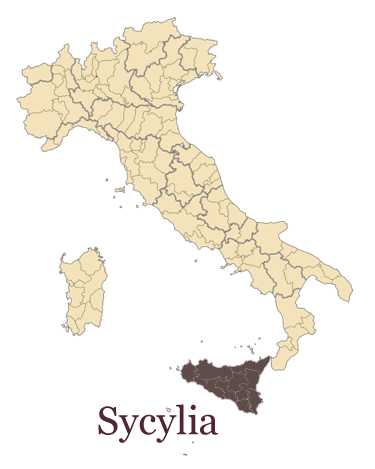
Sycylia
 Much more to it than mafia and volcanos! This biggest Italian island situated on the Mediterranean Sea has an extremely rich history - a combination of many cultures and civilisations that exerted significant influence on wine production in this region. Archaeological findings prove that Sicily was one of the first Italian regions to discover the culture of grape growing and wine production. The history of wine making in Sicily dates back to ancient times when the first varieties of grapes were brought here by Fenitians. During the Greek times, this island was one of the largest exporters of wine. Winemaking is favoured by excellent climate and soil conditions. The Mediterranean, dry and warm climate has always been good for cultivation. The sweet, golden Mamertino originating from the area of Messina was known to be one of the finest Italian wines as early as the Roman times. Also today, the island has the largest number of vineyards amongst all Italian regions.
Much more to it than mafia and volcanos! This biggest Italian island situated on the Mediterranean Sea has an extremely rich history - a combination of many cultures and civilisations that exerted significant influence on wine production in this region. Archaeological findings prove that Sicily was one of the first Italian regions to discover the culture of grape growing and wine production. The history of wine making in Sicily dates back to ancient times when the first varieties of grapes were brought here by Fenitians. During the Greek times, this island was one of the largest exporters of wine. Winemaking is favoured by excellent climate and soil conditions. The Mediterranean, dry and warm climate has always been good for cultivation. The sweet, golden Mamertino originating from the area of Messina was known to be one of the finest Italian wines as early as the Roman times. Also today, the island has the largest number of vineyards amongst all Italian regions.
For many years Sicilian wines did not enjoy as good an opinion as wines from Piedmont or Tuscany. The hot, almost African climate is favourable for large vineyard yield and mass production of wines that are inexpensive but lack sophistication and elegance. The only exception were red wines, the already mentioned Mamertimo, and foremost the famous Marsala produced on the west side of the island in vineyards surrounding a city of the same name. This wine is strengthened with a distillate, frequently with an addition of a sweet syrup made of boiled grape juice; it matures for many years in wooden barrels. White or red wine consists of approximately 18% alcohol concentration. This wine seasons for at least one year before it is admitted for sale. During the maturing process the wine is strengthened with spirit and sweetened with condensed must. Sweeter types of wine are served at the end of the meal, alone, while the young, dry Marsala is taken as an aperitif.
In the recent years, local winemakers have invested a lot of money in modern production technologies. Many outstanding wines are created from the local grape varieties - mostly Nero d’Avola (or Calabrese), Nerello Mascalese and Perricone (or Pignatello) from the dark varieties, and Inzolia and Grecanico of the light varieties. A significant role is played by international varieties, such as Chardonnay, Cabernet Sauvignon, Merlot and Syrah; these yield very good results in Sicily when the wine is produced from only one variety as well as when the wine is a combination of several varieties.
Sicilian wines are mainly characterised by strong flavour but also a high alcohol content, which is the result of insolation (250 days of sun annually) and a relatively high altitude. Also the geographical altitude at which the island is located is equivalent to the geographical altitude of Australia.
Production of wines in Sicily constitutes approximately 14% of the general Italian wine production. This largest island on the Mediterranean Sea has more vineyards than any other Italian region. However, since the emphasis was shifted from quantity to quality, Sicily recently noted a decrease of production to a level resembling the production level of the Veneto region.
The increasing status of Sicily among Italian wine regions is certified by a recent promotion to DOCG status of the Cerasuolo di Vittoria appellation which produced light-coloured yet strong red wine produced from the Nero d’Avola variety.
Sicily has 23 wine production zones of DOC class and 1 DOCG appellation.
FUNARO
The beginnings of the vineyard date back to the year 2003 when three brothers decided to produce high quality Sicilian wines from grapes exclusively of their production. Their enthusiasm combined with the wonderful climate, unique soil, traditional wine production methods and modern technology have led to creating a unique place called the Santa Ninfa.
85 hectares of the vineyard are located at the very heart of the Trapani region.
Commitment and sacrifice of the owners has allowed them to cultivate local grape types, such as Catarratto, Grillo, Zibibbo, Naro d’Avola, Perricone and the international Chardonnay, Mulle Thurgau, Sauvignon Blanc, Syrah, Merlot, Cabernet Sauvignon and Tannat.
Owners of the vineyard utilise ecological cultivation methods that follow from involvement and care for the natural environment.

